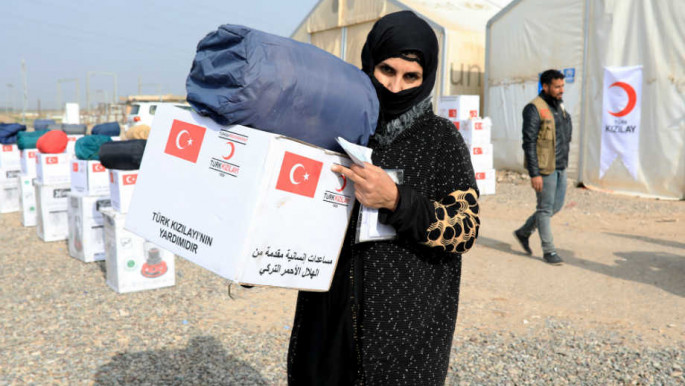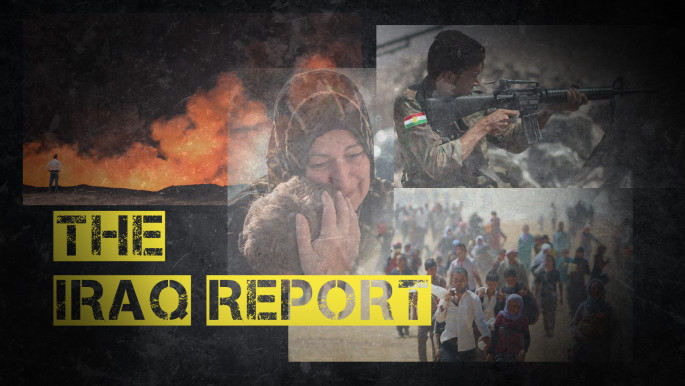The Iraq Report: 'Official Israel visits' spark militant anger as allegations of child torture resurface
While Iraq has traditionally considered Israel an enemy state since its creation in 1948, reports emerging from Israeli media sources appear to suggest a thawing of ties, causing Iraqi officials to react with flat denials - and pro-Iran Shia militias to issue death threats to all involved.
Domestically, the fallout from the war against the Islamic State group continues, as Kurdish officials have been accused of covering up grave human rights abuses including the torture of children. According to human rights organisations, children have been imprisoned and then tortured into forced confessions of being members of IS.
Meanwhile, veterans of the conflict are now complaining that Baghdad has abandoned them to their fates by failing to take care of those who lost life and limb fighting the brutal group.
Iran, Israel jostle over Iraq
The Iraqi political scene was thrown into embarrassment not long after the New Year was ushered in, as Israeli media reported on 6 January a series of visits to Tel Aviv by a high-level delegation consisting of 15 "influential" Shia and Sunni officials from Iraq.
The report appeared to be further confirmed by the Israeli Ministry of Foreign Affairs which released a Facebook post in Arabic stating that the 15 officials included "Shia, Sunni and local leaders who are influential in Iraq". The statement made clear the visits happened in December and included visits to the Yad Vashem Holocaust Remembrance Center as well as meetings with Israeli academics and senior Israeli officials.
The news was immediately picked up by Arab and global media, leading some pro-Iran militants in Iraq to vow to discover the identities of those who partook in the visit and to punish them.
Deputy Speaker Hassan Karim al-Kaabi - a close ally of election winner and militia leader Moqtada al-Sadr - called for an immediate investigation into the report to identify who had visited Israel, "particularly if they are lawmakers".
"To go to the occupied territories is a red line and an extremely sensitive issue for all Muslims," Kaabi said.
Speaking to The New Arab's Arabic language service, an Iraqi cabinet official categorically denied any Iraqi delegation had visited Israel.
"The information we have asserts that no-one has left Iraq to visit the Zionist entity," the official said, using a commonly used phrase in the Arab world when referring to Israel.
Despite the denial, the controversy came hot on the heels of Iraq's top diplomat, Mohammed Ali al-Hakim, making a political faux pas in the staunchly pro-Palestinian country by saying it would be Iraqi policy to support a two-state solution to the Israeli-Palestinian conflict.
Perhaps not wishing to be upstaged by the Israelis - or even US Secretary of State Mike Pompeo who visited just after the controversy arose to try to tempt Iraq away from Iran - Iranian Foreign Minister Mohammed Javad Zarif visited Baghdad to discuss ongoing US sanctions against Tehran's regime with his Iraqi counterpart.
Twitter Post
|
"We discussed the unilateral economic measures taken by the US and are working with our neighbour [Iran] on them," Hakim said in a press conference, following his meeting with Zarif, who called on regional countries to distance themselves from Washington.
"These [US] failures have continued for the past 40 years and my proposal to countries [in the region] is to not bet on a losing horse," Zarif said, referring to economic sanctions that have been imposed by the United States since 1979 and which have failed to curb Iranian ambitions.
While Iran and Israel have been exchanging heated words and Tel Aviv has openly bombed Tehran's troops in Syria, they do have a history of strong cooperation, particularly over Iraq. In the infamous Iran-Contra scandal that rocked the Reagan administration in the 1980s, Israel helped facilitate arms transfers and supplies to Iran despite Ayatollah Khomeini's threats to wipe Israel out.
Iranian intelligence also provided assistance to the operation which saw Israeli warplanes bombing Iraq's light water nuclear reactor in 1981.
Iraq does not formally recognise Israel and has been in an active state of war with Israel since 1948. Iraq fought against Israel in 1948, 1967 and 1973. In 1991, former Iraqi dictator Saddam Hussein ordered missile strikes against Tel Aviv during the Gulf War, the last formal military attack by an Arab power against Israel.
Kurdish authorities 'torturing children'
In a damning report released earlier this month, international human rights monitor Human Rights Watch (HRW)accused the Kurdistan Regional Government (KRG) of continuing to incarcerate and torture children they accuse of being members of IS.
HRW interviewed 23 boys who had been charged or convicted of IS membership and said 16 of them had reported being tortured by Kurdish security operatives, known as Asayish, in order to extract false confessions.
HRW accused the KRG of doing little to rein in Asayish agents who reportedly used electric shocks and beatings to force the children to confess to terrorism offences. Children interviewed by the rights group reported being held in stress positions including "the scorpion", in which the child's wrists are bound together over one shoulder, as well as being whipped with cables, beaten with rods, and burned with cigarettes.
After the children were made to sign blank documents, their confessions were reportedly filled in by Asayish interrogators who had denied the children access to family visits or lawyers. They were not even allowed to know what their confession said, and most reported not knowing the contents of their confession until it was read out before a judge - who invariably had them convicted.
 |
| Hundreds of thousands of internally displaced Iraqis remain dependent on humanitarian aid [Anadolu] |
Dindar Zebari, a KRG official, denied the regional government were torturing children and claimed "HRW never visited" the detention facility mentioned in their report. Zebari also stated the KRG did not condone the use of torture.
Nevertheless, HRW previously reported that Asayish agents were torturing children as early as 2016 when the battle to retake Mosul from IS militants began in earnest. Children were reportedly being detained at camps for the internally displaced and were tortured into signing false confessions of terrorist activity. All but one of those children interviewed by HRW was a Sunni Arab.
At the time, the KRG promised a full investigation and to bring those responsible to justice. However, no-one was indicted, no investigations were made public, and HRW has now reported that the torture of children continues to this day.
Considering the overwhelmingly Sunni Arab background of the children being targeted, locals suspect the KRG is motivated by a desire to force demographic change or to demonise a particular segment of society.
In January 2015, and in full view of Kurdish Peshmerga fighters, Yazidi militias attacked the Sunni Arab village of Buhanaya in Nineveh, killing unarmed men, women and children. Reports at the time also indicated that these sectarian fighters then proceeded to abduct Sunni women and force them into sexual slavery, exactly as IS had inflicted on Yazidi women.
Little was done by the KRG at the time and the fates of the women sexually enslaved by the Yazidi militants is as yet unknown, more than four years on and following the defeat of IS in December 2017. Similarly, the KRG has effectively forbidden Sunni Arabs from moving back into ethnically mixed towns including Makhmur, after they were expelled by Kurdish forces - all of which suggests the authorities in Erbil may be condoning crimes against this demographic to serve political ends.
Veterans who fought IS 'abandoned' by Baghdad
American broadcaster PBS reported last week that tens of thousands of Iraqi veterans of the war against IS "feel forgotten" by the authorities in Baghdad, with some expressing regret at having taken up arms to fight against the militant threat.
According to the report, survivors and families of those who fought, as well as wounded veterans, say the government has broken promises it made them to look after them. Approximately 30,000 people were wounded, with thousands more killed both from the Iraqi security forces and various Shia militias fighting under the umbrella of the Iran-backed Popular Mobilisation Forces (PMF), Hashd al-Sha'abi in Arabic.
One woman who was interviewed, Fawzia Kadhum, said her husband had fought alongside the PMF and was killed, but the government failed to pay out the promised pension to his family of 11 until a year and a half after he was slain. The pension was approximately $600 per month, equivalent to the salary of a low-level bureaucrat. Kadhum also accuses the PMF of reneging on an agreement to pay her a "death-benefit" of $4,000, granted to the families of those who fell in battle.
Ali Mahdi, a soldier who was left almost entirely paralysed by an IS sniper's bullet, says the defence ministry is refusing to pay for his treatment as it is "only available in Germany, America or Japan". While Iraqi defence officials arranged for him to have surgery in India, a second promised surgery to restore nerve function has yet to materialise.
"They just got rid of us. They don't need me anymore. It's a pity that we fought, it's a pity that we went," Mahdi said, lamenting his decision to heed the call to arms to push back the IS threat.
It is crucial that Iraq takes care of its veterans. Should another existential threat like IS materialise - and at one point in 2014, the group were at Baghdad's gates - then a similar call to arms may attract significantly fewer volunteers to lay down their lives for those they deem to be disloyal to their men.




